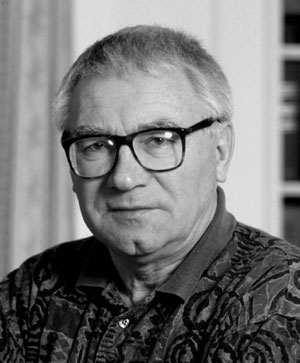Well, the third roll of this die (no doubt my critics will use the fact I’m using a 41-sided die in concert with symmetry theory to prove I’m a flatlander), I get 17. Looks like I lucked out somewhat - that’s landed in the “Believe global warming is primarily caused by natural processes” section again.
This time, it’s actually a climatologist, what luck!

George Kukla, retired Professor of Climatology at Columbia University and Lamont-Doherty Earth Observatory (LDEO), said in an interview: “What I think is this: Man is responsible for a PART of global warming. MOST of it is still natural.”
– From An Unrepentant Prognosticator Krueger, Mari Gelf Magazine, April 2007
Now this guy has been around for a while. In 1977 he was mentioned in a Time article (Time++ for having such an old article available online) denying that recent signs of cooling were signs of an impending Ice Age.
The article goes on to talk about Alfred Wegener, who was involved in the discovery of continental drift. Kukla’s institution, the LDEO was involved in the related work of plate techtonics. Wegener “championed” the (I believe reasonably well established) idea that the driver of the major ice ages is changes in the Earth’s rotational angle and so on - aka the Milankovitch Cycles. This may be one of mankind’s saving graces against global warming (I mean, if it were true of course); the natural tendency at the moment according to some should be one of cooling. Of course this is all way before Kukla’s time.
Anyway, moving on, there’s this article from 2000 which points out that this Holocene era (that’s a term for the recent warm times, since the last Ice Age) is not unusual; “evidence suggests that the pendulum-swing to an ice age-type climate may already be underway, Kukla said”.
Well, look at that. An about turn in under 23 years. Well, I guess there was a lot of studies and science done in all that time. Let’s not hold the man to account for this difference in opinion over the length of his career.
He suggests that a better indicator of climate is the difference in temperature between the poles and the equator, the larger it being, the closer we are heading to an Ice Age (and the lower sea levels will fall).
Actually, it seems that Gelf magazine inquired as to this difference in opinion, him being one of the few people still around from that era. Initially, the article paints him not as a skeptic or a denier, but more of an anti-worryist. He still is sticking to his guns about global cooling (emphasis mine);
What is happening is very similar to the time 115,000 years ago, when the last glaciation started. It is difficult to comprehend, but it is really so: The last glacial was accompanied by the increase of a really averaged global mean surface temperature, alias global warming.> What happened then was that the shifting sun warmed the tropics and cooled the Arctic and Antarctic. Because the tropics are so much larger than the poles, the area-weighted global mean temperature was increasing. But also increasing was the temperature difference between the oceans and the poles, the basic condition of polar ice growth. Believe it or not, the last glacial started with “global warming”!
He brings up the clouds issue (the effect of clouds is largely fudged in even modern climate models, at least according to one article on climate change skepticism I read); (emphasis mine):
The CO2 certainly has an influence. For instance, it appears that already now, with still relatively low concentrations, it may have a significant warming impact on the night [temperature] minima. And because the usual way to determine the daily mean is as the average of the daily minimum and maximum, here we go! But it is difficult to be sure: more clouds can do the same.
Kukla has a paper from 2005, I think in the area of paleontology (I’ve probably got that wrong - the study of deep sea sediment).
I’ve tried a few searches, but I just can’t find a well reasoned rebuttal to this guy’s work. He seems to be making a legit statement, within his field. And in hindsight, his position seems remarkably well explained and difficult to fault. Even the cronies on realclimate.org have nothing to say.
However.
His prediction is rather long-term. The chances of the Yellowstone caldera erupting and causing super-rapid cooling the like we haven’t seen in perhaps 700,000 years are also on the same radar as his work.
So anyway, it looks like out of the three random people I chose to investigate, one seems to have a flawed study. One wasn’t even a scientist, and the last one is just saying “don’t worry, the world might plunge into an Ice Age any day now (or in the next 10,000 years or so).”
I think that’s enough to call it inconclusive. I’d love to see other people go through a similar exercise and see what they can find. However, the people really should be chosen at random, and the task should be undertaken by someone who believes themselves to be neither a denier nor an alarmist. If someone does this, I’d be delighted to link to their findings.